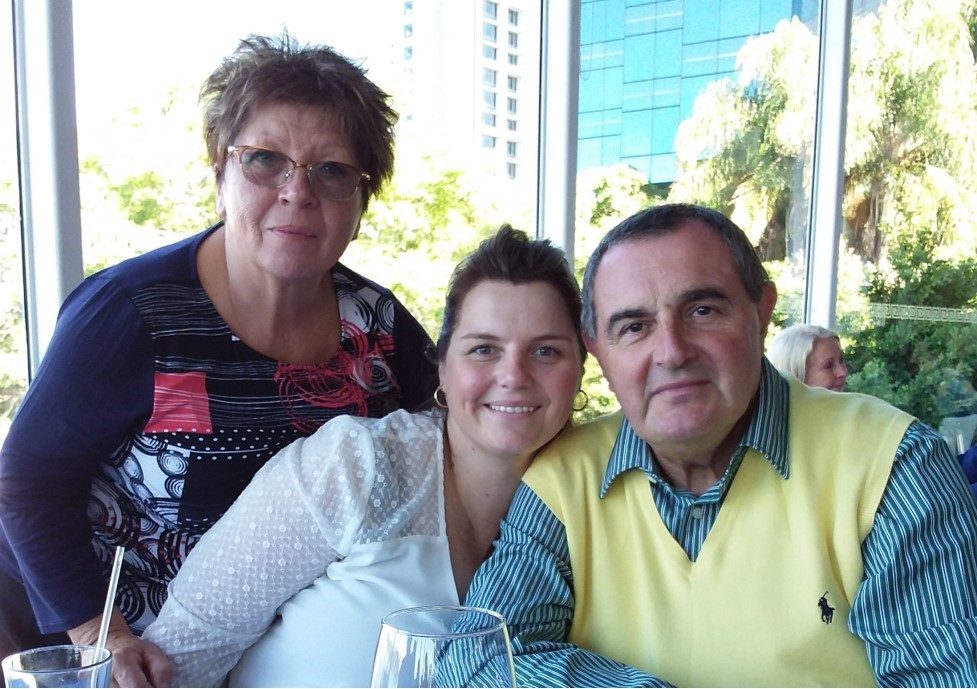A trial put Joe in remission for six years and counting
Jozsef (Joe) Mulaahmetovics was among the 13 Australians with amyloidosis who participated on the international ALLG MM13 trial which he says saved his life.
When he was diagnosed with AL amyloidosis in the heart, in January 2013, Jozsef had never heard of the disease.
“Amyloid in the heart causes the heart to stiffen so it is unable to fully relax and fill up with blood,” said Joe, 65, a retiree.
“Even though the heart muscle may still be able to contract normally, blood supply to the body is less efficient, so there may be reduced blood flow to vital organs.”
The thickness of Joe’s stiffened heart wall was 12.5 mm. This has since reduced to 11 mm which he says, “is not much”, and it causes ongoing fatigue and weakness.
Soon after his diagnosis and before starting any other treatment, Joe’s haematologist, Dr Peter Mollee, mentioned a clinical trial. Within a few days Joe was accepted on to that trial and not long after that he started the treatment protocol.
“When you are diagnosed with a life-threatening disease and your survival chance is very slim, you are absolutely shocked, so I was very happy and lucky to have the opportunity to go on the trial.
“The chemo was melphalan and dexamethasone, and for a few lucky patients like me, I got the additional bortezomib (Velcade®) injections in the stomach twice a week for the first four weeks.
“When my stomach became really red and hot and covered in welts, I was administered the bortezomib in the arm from then on.
“I was thankful to be accepted on the trial and even happier when I found out my body was responding to the bortezomib.”
At the time Joe and his family were living on Queensland’s Gold Coast.
“During the trial we travelled to Brisbane’s Princess Alexandra (PA). Hospital to get the Velcade injection 2-3 times a week, sometimes more often. We didn’t need to stay overnight.
“My treatment started in June and finished in late-December in 2013,” said Joe who hasn’t had any further treatment for amyloidosis since.
“My body slowly started to respond to the treatment and my blood count started to move down slowly. It was a slow process, but positive signs started.
“Around late-November, Dr Mollee reduced the amount of Velcade because I had more and more side-effects. He was worried about permanent damage.
“After the treatment I went to PA for a check-up every 3-4 weeks, then later on, it was every six weeks.
“It took nearly two years when Dr Mollee said, ‘you are in remission’.”
“Prior to starting the trial, I also underwent a stem cell collection procedure for future treatment if necessary,” explained Joe, but he hasn’t needed to use these stored stem cells.
Now Joe, his wife Katalin, and their daughter, Sylvia, (pictured above) live at Bribie Island north of Brisbane.
“Constant fatigue forced me to stop working. I was an accommodation manager at the Gold Coast, responsible for taking care of a holiday complex and letting the apartments,” said Joe, who is still plagued by a range of side-effects.
He describes these as including “nerve pinching, joint pain, pain in my toes, shooting pain in the side of my leg, blurry vision sometimes, shaking hands, tiredness, numbness in fingers, left leg and arm, forgetting words, dizziness, derealisation, and brain fog sometimes.
“But all things considered, I feel very lucky.”
“If there is one thing I could tell other people diagnosed with amyloidosis, it would be to never give up.
“I feel extremely lucky to have been diagnosed at an early stage and that I received help immediately. After six months of chemotherapy treatment I’m still in remission. I feel happy.’
“It is very important to stay strong and positive mentally. Follow the doctor’s orders, eat well and rest as much as you can. Join groups and meet other people with the same condition.”
Joe continues to have three-monthly check-ups, which includes an amyloid blood and urine test, and once a year he has an ultrasound and x-ray.
“I’m still in remission and I am absolutely sure the treatment saved my life. I wouldn’t have survived without it, and Dr Mollee,” he said.
“Living with amyloidosis can certainly be challenging but a positive attitude and having the support of medical professionals and your loved ones goes a long way in fighting this disease.”
Joe goes to meetings with other amyloid patients at the Leukaemia Foundation.
“In the initial stages of my diagnosis they [the Leukaemia Foundation] provided a one-off rebate on one of my household utility services, which was of great assistance.”
Last updated on January 3rd, 2023
Developed by the Leukaemia Foundation in consultation with people living with a blood cancer, Leukaemia Foundation support staff, haematology nursing staff and/or Australian clinical haematologists. This content is provided for information purposes only and we urge you to always seek advice from a registered health care professional for diagnosis, treatment and answers to your medical questions, including the suitability of a particular therapy, service, product or treatment in your circumstances. The Leukaemia Foundation shall not bear any liability for any person relying on the materials contained on this website.